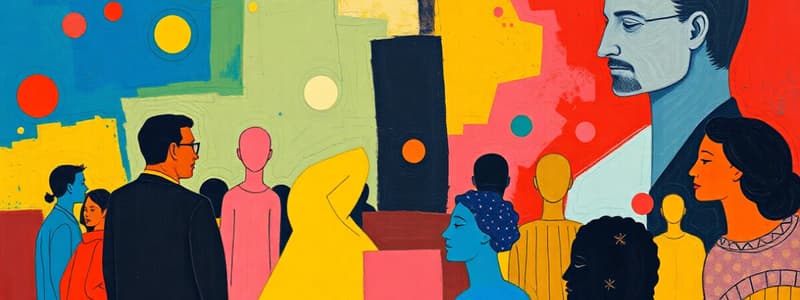Podcast
Questions and Answers
What is the focus of modern society in relation to individual roles?
What is the focus of modern society in relation to individual roles?
- Emphasis on tradition and heritage
- Collective identity over individual identity
- Reinforcement of communal values
- Focus on individualism and rationalization (correct)
Which of the following concepts is defined as the organized pattern of social relationships and institutions?
Which of the following concepts is defined as the organized pattern of social relationships and institutions?
- Sociological imagination
- Social structure (correct)
- Collective conscience
- Socialization
According to conflict theory, what is viewed as the primary source of societal structures?
According to conflict theory, what is viewed as the primary source of societal structures?
- Economic balance
- Conflict and inequality (correct)
- Technological advancement
- Cultural harmony
What role does social cohesion play in Durkheim's theory of societal change?
What role does social cohesion play in Durkheim's theory of societal change?
What is the primary distinction between social science knowledge and everyday knowledge?
What is the primary distinction between social science knowledge and everyday knowledge?
Which sociologist emphasized the role of rationalization in societal change?
Which sociologist emphasized the role of rationalization in societal change?
What does the concept of agency refer to in sociology?
What does the concept of agency refer to in sociology?
Which of the following is NOT a key characteristic of modern society?
Which of the following is NOT a key characteristic of modern society?
What defines sociological imagination?
What defines sociological imagination?
Which of the following sources is typically associated with everyday knowledge about society?
Which of the following sources is typically associated with everyday knowledge about society?
What is a primary strength of using surveys in social science research?
What is a primary strength of using surveys in social science research?
How do qualitative methods differ from quantitative methods in research?
How do qualitative methods differ from quantitative methods in research?
Which component of culture is represented by flags and religious icons?
Which component of culture is represented by flags and religious icons?
What characterizes the concept of 'culture as social construction'?
What characterizes the concept of 'culture as social construction'?
What is meant by informal deviance?
What is meant by informal deviance?
Which of the following is an example of a primary agent of socialization?
Which of the following is an example of a primary agent of socialization?
According to Mead’s theory, how does socialization occur?
According to Mead’s theory, how does socialization occur?
Which perspective suggests that deviance clarifies norms and promotes social cohesion?
Which perspective suggests that deviance clarifies norms and promotes social cohesion?
What difference exists between a personal identity and a social identity?
What difference exists between a personal identity and a social identity?
What defines sanctions in a social context?
What defines sanctions in a social context?
Flashcards are hidden until you start studying
Study Notes
Modern Society and Theories
- Modern society is characterized by industrialization, urbanization, secularization, increased technology use, individualism, rationalization, social mobility, and global interconnectedness.
- Marx believes economic factors and class conflict drive societal change.
- Weber believes rationalization, especially through bureaucracy and religious influence (e.g., Protestant work ethic), shapes societal change.
- Durkheim believes social cohesion and collective conscience are fundamental, and that societal change emerges from shifts in how societies maintain solidarity.
- Functionalism views society as a complex system whose parts work together to promote stability and social order. Each part serves a function that contributes to the whole.
- Conflict theory focuses on the power struggles between different social classes or groups, seeing societal structures as the outcome of conflict and inequality.
- Sociological imagination is the ability to see the relationship between individual experiences and larger societal influences.
- Social structure is the organized pattern of social relationships and social institutions that make up society.
- Social construction is the idea that social realities (like gender roles or race) are created and maintained through social processes and interactions.
- Social order is the arrangement of practices and behaviors on which society's members base their daily lives, which keeps society functioning.
- Socialization is the process through which individuals learn and internalize the values, norms, and practices of their society.
- Agency is the capacity of individuals to act independently and make their own choices.
Social Science Research
- Social science knowledge is systematic, empirical, and based on research and data analysis.
- Sources of everyday knowledge about the social world include personal experiences, cultural norms, traditions, media, and family.
- Social science research utilizes systematic methodologies, rigorous data collection and analysis, and seeks to produce replicable and generalizable results.
- Quantitative methods focus on numerical data, using statistics to find patterns and correlations.
- Qualitative methods focus on understanding behaviors and experiences through interviews, observations, and content analysis.
- Surveys are strong for gathering data from large populations quickly, but may not capture the depth of individual experiences.
- In-depth interviews provide deep, detailed insights, but are time-consuming and not easily generalizable.
- Non-participant observation can observe behaviors without influencing them, but offers limited understanding of participants' internal states.
- Participant observation immerses the researcher in the environment for deeper understanding, but risks researcher bias.
- Ethnography provides a holistic view of a culture or community, but is time-intensive and difficult to generalize.
- Research ethics are guidelines to ensure the integrity of research and the protection of participants. They are necessary to maintain trust, avoid harm, and ensure that research is conducted responsibly.
Culture
- Culture refers to the shared values, norms, symbols, languages, and artifacts that members of a society use to interpret and respond to the world.
- Symbols include flags, and religious icons.
- Language includes English, Spanish, and sign language.
- Values include freedom and equality.
- Norms include shaking hands and table manners.
- Artifacts include clothing and technology.
- Culture's role in society is to help individuals make sense of the world, guide behavior, and create a sense of belonging and identity.
- Culture as inheritance is passed down from generation to generation, often seen as static.
- Culture as a social construction is continuously shaped by social interactions and experiences.
- Sociological explanations of human behavior focus on the influence of social environments and cultural practices.
- Biological explanations attribute behavior to genetics and biology.
- Culture as freedom allows individuals to express themselves and create new meanings.
- Culture as a constraint imposes rules and norms that limit behavior and thinking.
Socialization
- Socialization is the process by which individuals learn and internalize the norms, values, and behaviors of their society.
- The purpose of socialization is to prepare individuals to participate in social life and maintain the continuity of culture and society.
- Primary agents of socialization include family, peers, education, media, and religious institutions.
- Personal identity is unique personal characteristics and traits.
- Social identity is how individuals are perceived and categorized based on social roles and group memberships (e.g., gender, race).
- Sanctions are rewards or punishments that encourage conformity to social norms.
- Mead’s theory of taking on the role of others describes socialization as individuals imagine themselves in others' roles, learning social norms by understanding how others might perceive and react to their actions.
- Working-class parents emphasize accomplishment of natural growth, focusing on children's independence and unstructured time.
- Middle-class parents practice concerted cultivation, actively structuring children's time and fostering skills and talents.
The Mask You Live In Film
- Gender norms/expectations for males include being tough, emotionally reserved, and dominant.
- These norms are reinforced by family, media, and peers through socialization and societal pressure.
- The consequences of these gender norms/expectations can lead to emotional repression, aggression, and mental health struggles.
Deviance
- Social control refers to the mechanisms society uses to regulate individuals' behavior to maintain social order.
- Deviance is behavior that violates social norms or expectations.
- Informal deviance includes minor norm violations (e.g., wearing inappropriate clothes).
- Formal deviance includes breaking laws or officially sanctioned rules (e.g., theft).
- Deviance as a social construction means that deviance is defined by societal norms and can change depending on context and culture.
- Arguments in favor of deviance include the potential to challenge norms and bring about social change.
- Arguments against deviance include disruption to social order and potential harm.
- Durkheim’s functionalism theory explains deviance as serving a function by clarifying norms and promoting social cohesion.
- Merton’s strain theory states that deviance arises when individuals cannot achieve societal goals through legitimate means.
- Conflict theory explains deviance as resulting from social inequality, where those in power define what is deviant.
- Labeling theory suggests deviance occurs when society labels individuals as deviant, affecting their self-identity.
- Control theory explains deviance as happening when an individual’s bonds to society are weak.
Studying That Suits You
Use AI to generate personalized quizzes and flashcards to suit your learning preferences.




